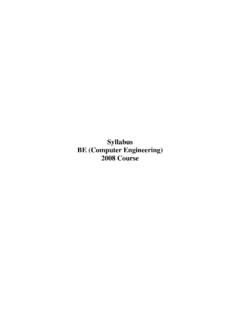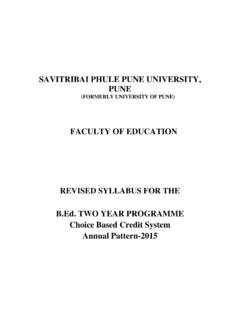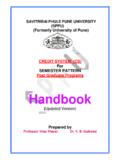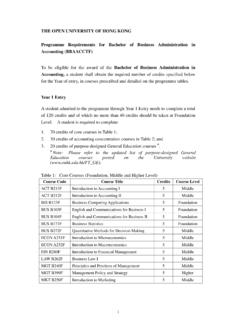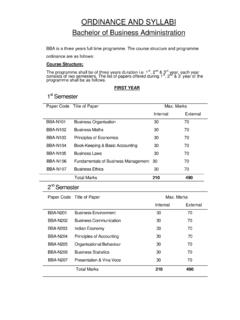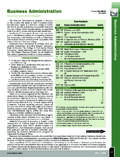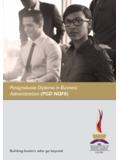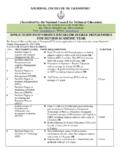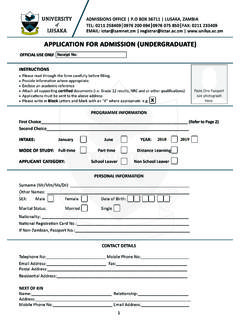Transcription of UNIVERSITY OF PUNE COURSE STRUCTURE FOR …
1 UNIVERSITY OF pune . COURSE STRUCTURE FOR. bachelor OF business administration ( ). 1. Title : The degree shall be titled as bachelor of business administration ( ) under the Faculty of Commerce the academic year 2008-2009 Part II 2009-2010 and Part III 2010-2011. 2. Objectives : (i) To provide adequate basic understanding about Management Education among the students. (ii) To prepare students to exploit opportunities being newly created in the Management Profession. (iii) To train the students in communication skills effectively. (iv) To develop appropriate skills in the students so as to make them competent and provide themselves self-employment. (v) To inculcate Entrepreneurial skills. 3. Duration : The COURSE shall be a full time COURSE and the duration of the COURSE shall be of three years. 4. Eligibility : (i) A candidate for being eligible for admission to the Degree COURSE in bachelor of business administration shall have passed 12th Std.
2 Examination ( 10+2) from any stream with English as passing subject and has secured 45% marks at 12th Std. (ii) Two years Diploma in Pharmacy after , Board of Technical Education conducted by Government of Maharashtra or its equivalent. (iii) Three Year Diploma COURSE (after , 10th Standard) of Board of Technical Education conducted by Government of Maharashtra or its equivalent. (iv) MCVC. (v) Every eligible candidate has to pass a Common Entrance Test to be conducted by the respective Institute/College. 5. Medium of Instruction: Medium of instruction shall be in English only. 6. Scheme of Examination : The Examination will be 3600 marks divided into 3 parts as per details given below : (i) Part I (Sem I, II) Aggregate marks 1200. (ii) Part II (Sem III, IV) Aggregate marks 1200. (iii) .Part III (Sem V, VI) Aggregate marks 1200.
3 There will be written Examination of 80 marks 3 hrs duration for every COURSE at the end of each Semester. The class work will carry 20 marks in each COURSE . For Courses in Industrial Exposure (Sem III, IV) there will be viva voce examination of 20 marks and for Written Report and Industrial visits 80 marks. For COURSE on Project work (Sem VI) there will be oral presentation test consisting of 20 marks and Written Report of 80 marks. 7. Backlog : a) A student shall be allowed to keep term for the Second Year, if he/she has a backlog of not more than three theory & one practical or four theory heads of total number of subjects of the First year examination, which consist of First & Second Semester. b) A student shall be allowed to keep term for the Third year, if he/she has no backlog of first Year & if he/she has a backlog of not more than three theory & one practical or four theory heads of total number of subject of the Second Year examination which consist of Third & Fourth Semester.
4 8. Standard of Passing and Award of Class : In order to pass examination a candidate has to obtain 40% marks out of 100 (Sem-end exam 80 + class work marks 20 taken together) in each COURSE . The award of class : The class shall be awarded to the student on the basis of aggregate marks obtained by him in all three years (Part I, II and III). The award of Class is as follows : (i) Aggregate 70% and above .. First Class with Distinction. (ii) Aggregate 60% and above but less than 70%.. First Class (iii) Aggregate 55% and more but less than 60% .. Higher Second Class (iv) Aggregate 50% and more but less than 55%.. Second Class. (v) Aggregate 40% and more but less than 50% .. Pass Class. (vi) Below 40% .. Fail. First Year ( ). Sr. Sem I Sem II. No 1) business Organisation & System (101) 1) Principles of Managements (201). 2) business Communication Skills (102) 2) Principles of Marketing (202).
5 3) business Accounting (103) 3) Principles of Finance (203). 4) business Economics (Micro) (104) 4) Basics of Cost Accounting (204). 5) business Mathematics (105) 5) business Statistics (205). 6) business Demography & (106) 6) business Informatics (206). Environmental Studies 2nd Year ( ). Sem III Sem IV. 1) Personality Development (301) 1) Production & Operations Management (401). 2) business Laws (302) 2) Industrial Relations & Labour laws (402). 3) Human Resource Management & 3) business Taxation (403). Organisation Behaviors (303). 4) Management Accounting (304) 4) International business (404). 5) business Economic (Macro) (305) 5) Management Information System (405). 6) Management (306) 6) business Exposure (Field Visits ) (406). 3rd Year ( ). Sem V Sem VI. 1) Supply & Chain logistics (501) 1) business Planning & Project Management (601).
6 2) Entrepreneurship Development (502) 2) Event Management (602). 3) business Ethics (503) 3) Management Control System (603). 4) Research Methodology 4) E- Commerce (604). (Tools & Analysis ) (504). 5) Specialisation I (505) 5) Specialisation III (605). 6) Specialisation II (506) 6) Specialisation IV (606). Available Specializations 1) Finance 2) Marketing 3) Human Resource Management 4) Service Sector Management 5) Agree business Management. PROGRAMME : BBA. ( bachelor of business administration ). BUISNESS ORGANISATION & SYSTEMS. COURSE CODE: 101. Total Marks: 100. OBJECTIVE:- On successful completion of this syllabi the students will 1. Understand the basic concepts in commerce, trade and industry. He will be exposed to modern business world. 2. Understand modern business practices, forms, procedures and functioning of various business organizations.
7 The purpose of this paper is to impart to the students an understanding of business concepts with a view to prepare them to face emerging challenge of managing business . Semester-I. No. of Lectures 1. Meaning, scope and evolution of commerce & industry, -Industrial Revolution- its effects. -Emergence of Indian MNCs & transnational corporations -Recent trends in business world. Globalization & challenges for Indian business in new millennium. (8). 2. business sectors & forms of business organizations- private sector, Cooperative sectors, public sector, joint sector, Services sector, Various forms of business organizations Sole Proprietorship, Partnership firms, Joint stock companies -their features, relative merits, demerits & suitability (8). business combinations 3. Merges & acquisitions-mergers in India. Networking, Franchising, BPOs &.
8 KPOs, E-commerce, On-line trading, patents, trademarks & copyright (8). 4. Setting up a New Enterprise Decisions in setting up an Enterprise opportunity and idea generation, Role of creativity and innovation, Feasibility study and business Plan, business size and location decisions, various factors to be considered for starting a new unit, Relevant Government Policies - SEZ (Special Economic Zone) policy etc. (8). 5. Domestic & Foreign Trade Organization of wholesale & retail trade - recent trends in wholesale &. retailing. Malls and Super Markets their effect on economy - Organization of finance, transport, insurance Communication & other utilities (services) to trade, import export trade procedure & their organization. (8). 6. business and Society Changing Concepts and Objectives of business , Professionalisation, business ethics, business and culture, Technological Development and Social Change, Social Responsibility of business , Social Audit (8).
9 Books Recommended: 1. Modern business Organization by S. A. Sherlekar 2. Industrial Organization Management: Sherlekar, Patil, Paranjpe, Chitale 3. business Organization and Management By Jallo, Tata McGraw Hill 4. business Environment Text and Cases By F. Cherunilam (Himalaya Publication House). 5. Organizing and Financing of Small Scale Industry By Dr. V. Desai 6. Industrial Organization and Management By Dr. C. B. Gupta, Publisher Sultan Chand & Co. Delhi 7. business Organization and Management By Dr. C. B. Gupta, Publisher Sultan Chand & Co. Delhi business Communication Skills COURSE Code: 102. Objectives: 1) To understand the concept, process and importance of communication. 2) To gain knowledge of media of communication. 3) To develop skills of effective communication - both written and oral. 4) To help students to acquaint with application of communication skills in the business world.
10 Semester I. No. of Lectures Unit 1: Introduction to Communication Meaning and Definition - Process - Functions - Objectives - Importance - Essentials of good communication - Communication barriers - Overcoming communication barriers 12. Unit 2: Types of Communication Written - Oral - Face-to-face - Silence - Merits and limitations of each type 12. Unit 3: business Letters Need and functions of business letters - Planning & layout of business letter - Kinds of business letters - Essentials of effective correspondence - 5. Unit 4: Drafting of business letters Enquiries and replies - Placing and fulfilling orders - Complaints and follow-up - Sales letters - Circular letters - Application for employment and resume - Report writing - Notices, Agenda and Minutes of the Meetings - Memos 12. Unit 5: Oral Communication Meaning, nature and scope - Principles of effective oral communication - Techniques of effective speech - Media of oral communication (Face-to-face conversation - Teleconferences - Press Conference Demonstration - Radio Recording - Dictaphone Meetings - Rumor - Demonstration and Dramatisation - Public address system - Grapevine - Group Discussion - Oral report - Closed circuit TV).
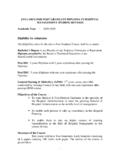
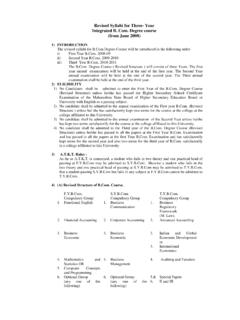
![[4372]-101 - Savitribai Phule Pune University](/cache/preview/f/c/3/4/c/a/0/f/thumb-fc34ca0f7a382c46206f2b1007598e60.jpg)


